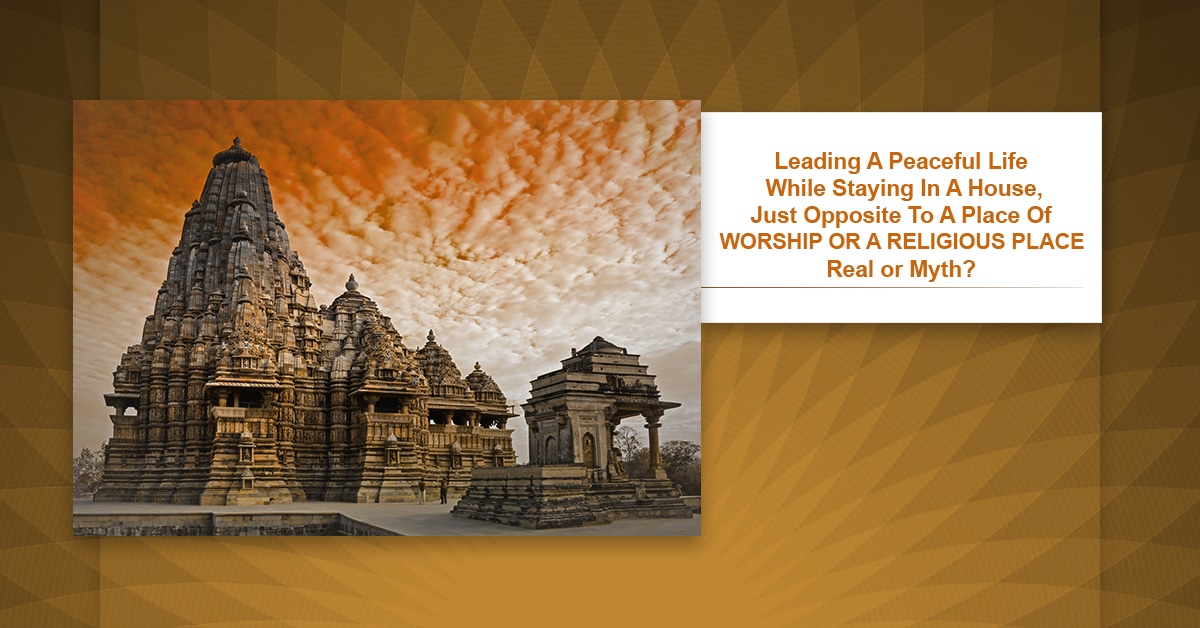I wish to question the ‘Vaastu Pandits’ who triumphantly declare that no one should stay in a house like this where the shadow of the temple falls, otherwise it would mean the sure death of the ‘karta’ or the ‘breadwinner’ of the family, that if a middle class person invests his ‘life time’ savings on purchasing a house of his own after taking loans and other recourse, finds out after some time that a temple is going to come in its vicinity, then what shall he do ? After spending about 15-20 lacs of rupees of his whole life savings or having taken a hefty loan for which he is paying a monthly E.M.I. from his salary, what exactly he could do now; should be sell his house for whatever he gets maybe at a lower price or take another loan from outside, burdening himself all the more? What options such a desperate person may have because of this kind of ‘impractical belief’ prevalent in society. May be he won’t be able to sell his house as considering it ‘inauspicious’, nobody will buy it again for resale. Saral Vaastu too believes houses ideally should not be built in front of the temples or places of worship as it can lead to some problems or Vaastu Defects. There is also a scientific reason behind this rationale.
As discussed earlier, we go to places of worship as it gives us ‘Peace of Mind’. During the ‘aarti’ or the evening worship time, the environment is filled up with the scent of the holy incense sticks, ‘lobaan’ and ‘dhoop sticks’, the heavenly smell of the burning of ‘holy camphor’, pure ghee diyas, candles and mustard oil or til oil lamps, synchronized beating of gongs, conch shells, drums, dhaks and nagaras; all of them contribute to create the holy atmosphere in which we immerse ourselves in meditation and deeply remembering our gods and goddesses to gain this momentary bliss of fleeting happiness.
All these rituals that are there in each and every religion for eg. lightening and burning of candle sticks on the big candle stands or silver candlesticks during the christian festivals or the oil filled ‘diyas’ to last throughout the night or even on the nine days of ‘navratri’, the ‘akhand jyoti’ that is filled up with oil after every night as the flame or the ‘jyoti’ should not become extinguished any time during the auspicious nine days, followed by the hindus, are an essential tenet of their religious festivities and culture. The ‘peace of mind’ and the ‘tranquility’ that the devotees get is beyond any kind of description. The concept of ‘moksha’ or salvation is also the philosophy associated with the hindu religion that has got its origin in the harnessing of the positive energies and banishing the negative energies from our households and workplaces forever as also from our lives. All these rituals signify the varied type of negative energy lurking in the surroundings to be replaced by the positive energy through our inner purity and mental peace and tranquility. Now, the sum total of all the accumulated negative energies when are being pushed out by the positive energy sources, enter the nearest households that are easily accessible. The unsuspecting family members become unwilling pawns in the path of the onslaught of massive negative energies being bombarded continuously into the inhabitants of these unlucky householders, causing sudden and unexplained ill-health, sickness, weakness and other sundry health issues that completely disrupts the regular schedule of the members of the concerned families, leaving the whole family distraught, vulnerable and at the mercy of their destinies. Ultimately the inner peace of mind & tranquility of the family members are effected the most as they are totally unaware of what hit them, struggling in the dark about the certain turn of events.
Similarly if a mosque faces a house or vice-versa or even a small ‘dargah’ or holy saint burial place has a house or houses just opposite or in the vicinity, it can lead to utter lack of peacefulness, peace and tranquility at homes of the residents, afflicting their households as well as each and every member’s life. In order to safeguard the residents and their mental sanity, that also takes its toll on the relationship between the family members causing unexplained and unnecessary rifts among them driving them away from each other, then without moving out from the present dwelling or disposing it off or selling it off, the only recourse left for the householders to avoid all these troubles, would be through the easy to apply, scientific solutions of Saral Vaastu, being implemented fully in their respective households , without indulging in any breakages, renovations or alterations of any kind.
This would effectively put an end to the speculation of house changing or disposing off for good, due to the timely intervention of Saral Vaastu and its easy to apply plans and easy to apply solutions.













